Organisational Learning's Impact on Performance Improvement
VerifiedAdded on 2023/06/08
|10
|2905
|223
Essay
AI Summary
This essay delves into the significance of organisational learning in enhancing overall performance. It begins by defining organisational learning as a process of continuous improvement through experience and knowledge transfer. The main body explores various learning theories such as double-loop, single-loop, and deutero learning, along with the communities of learning including individual, group, and organisational learning. The essay highlights key processes like knowledge creation, retention, and transfer, emphasizing the role of managers in fostering these processes. Furthermore, it examines experiential learning theory, including its stages (concrete learning, reflective observation, active experimentation, and abstract conceptualization), and generative and adaptive learning approaches. The essay also discusses assimilation in business, emphasizing the importance of employee learning and knowledge sharing. Ultimately, the essay underscores how these organisational learning theories can lead to improved employee job satisfaction, reduced turnover, and enhanced organisational performance, providing a comprehensive overview of how businesses can foster a culture of continuous learning and improvement.
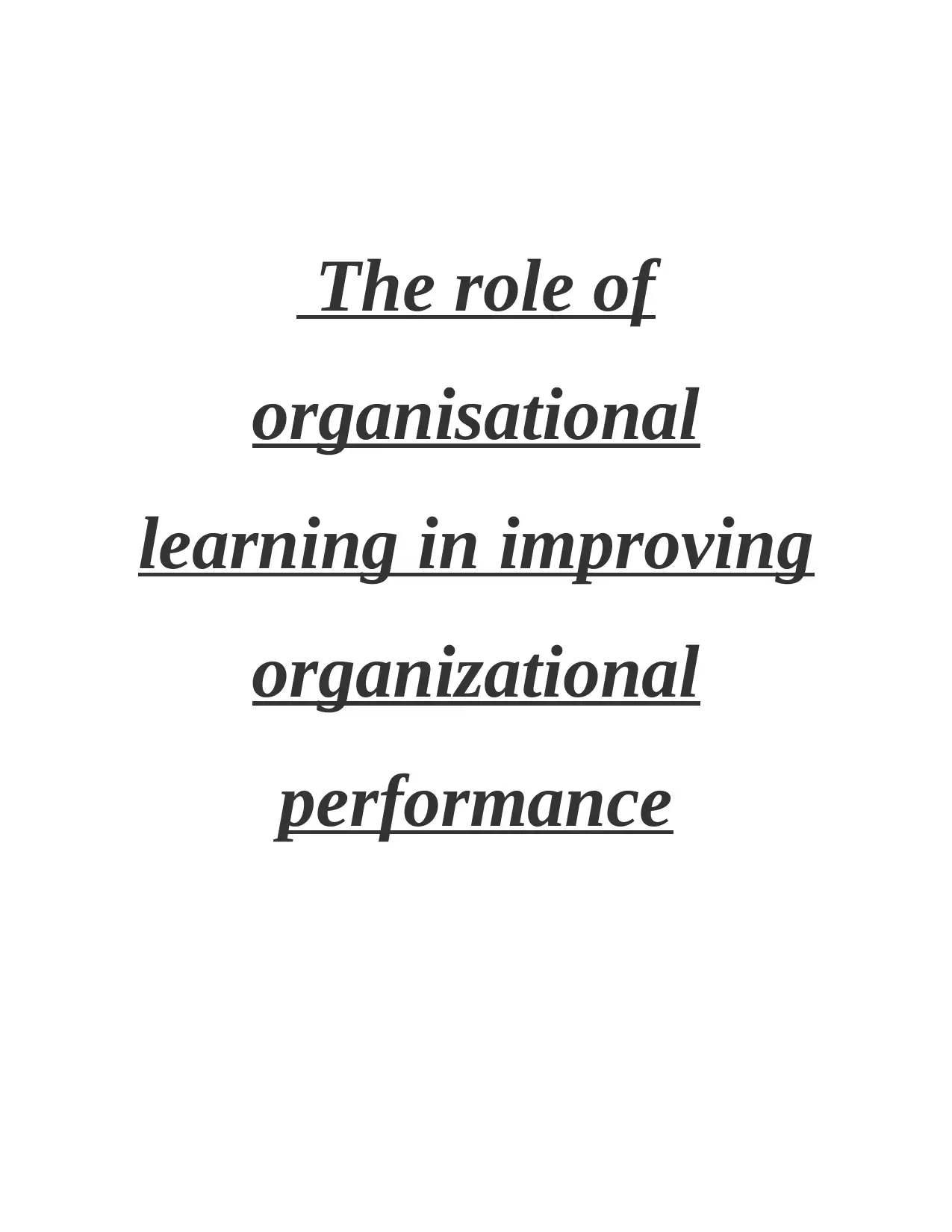
The role of
organisational
learning in improving
organizational
performance
organisational
learning in improving
organizational
performance
Paraphrase This Document
Need a fresh take? Get an instant paraphrase of this document with our AI Paraphraser

Contents
INTRODUCTION...........................................................................................................................1
MAIN BODY ..................................................................................................................................1
CONCLUSION................................................................................................................................7
REFERENCES................................................................................................................................8
INTRODUCTION...........................................................................................................................1
MAIN BODY ..................................................................................................................................1
CONCLUSION................................................................................................................................7
REFERENCES................................................................................................................................8
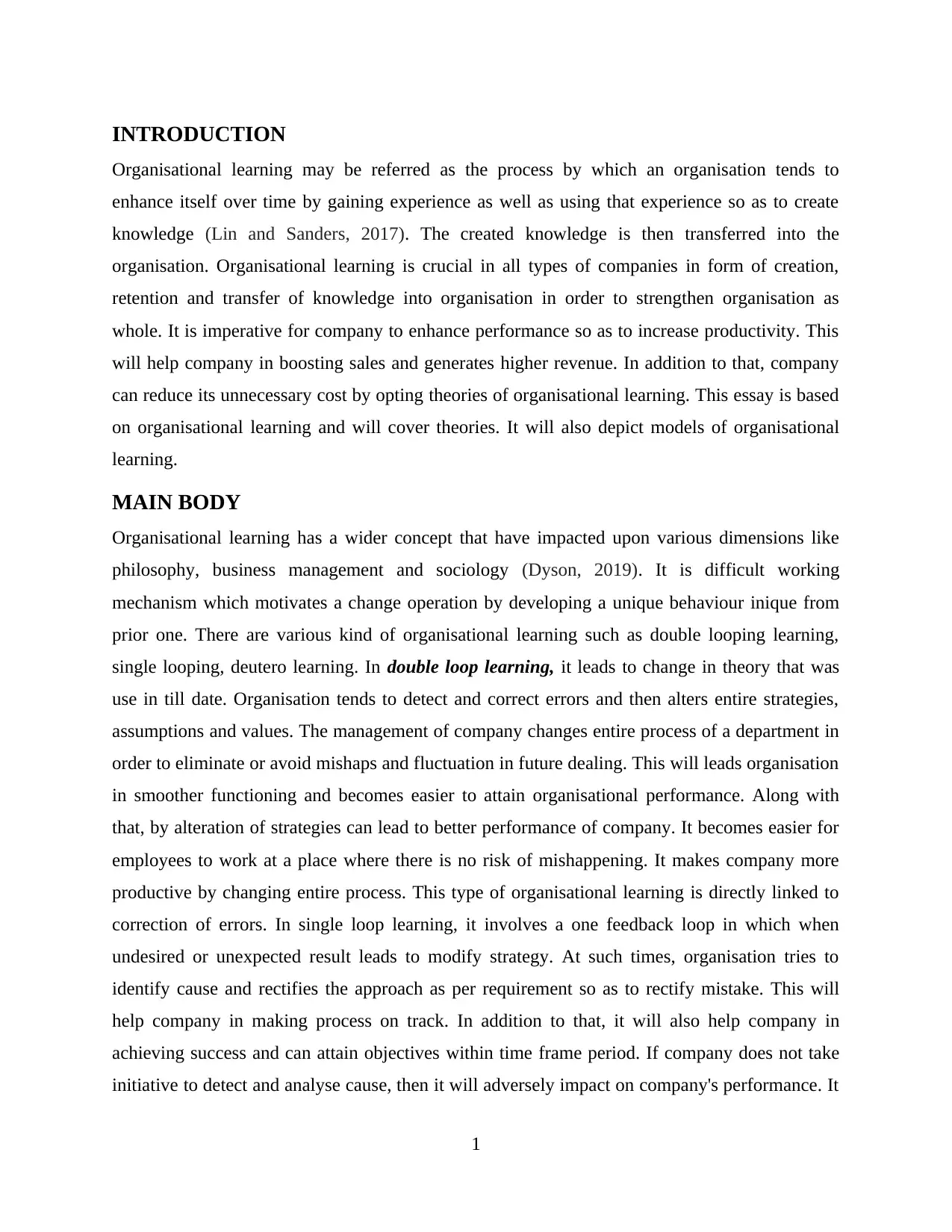
INTRODUCTION
Organisational learning may be referred as the process by which an organisation tends to
enhance itself over time by gaining experience as well as using that experience so as to create
knowledge (Lin and Sanders, 2017). The created knowledge is then transferred into the
organisation. Organisational learning is crucial in all types of companies in form of creation,
retention and transfer of knowledge into organisation in order to strengthen organisation as
whole. It is imperative for company to enhance performance so as to increase productivity. This
will help company in boosting sales and generates higher revenue. In addition to that, company
can reduce its unnecessary cost by opting theories of organisational learning. This essay is based
on organisational learning and will cover theories. It will also depict models of organisational
learning.
MAIN BODY
Organisational learning has a wider concept that have impacted upon various dimensions like
philosophy, business management and sociology (Dyson, 2019). It is difficult working
mechanism which motivates a change operation by developing a unique behaviour inique from
prior one. There are various kind of organisational learning such as double looping learning,
single looping, deutero learning. In double loop learning, it leads to change in theory that was
use in till date. Organisation tends to detect and correct errors and then alters entire strategies,
assumptions and values. The management of company changes entire process of a department in
order to eliminate or avoid mishaps and fluctuation in future dealing. This will leads organisation
in smoother functioning and becomes easier to attain organisational performance. Along with
that, by alteration of strategies can lead to better performance of company. It becomes easier for
employees to work at a place where there is no risk of mishappening. It makes company more
productive by changing entire process. This type of organisational learning is directly linked to
correction of errors. In single loop learning, it involves a one feedback loop in which when
undesired or unexpected result leads to modify strategy. At such times, organisation tries to
identify cause and rectifies the approach as per requirement so as to rectify mistake. This will
help company in making process on track. In addition to that, it will also help company in
achieving success and can attain objectives within time frame period. If company does not take
initiative to detect and analyse cause, then it will adversely impact on company's performance. It
1
Organisational learning may be referred as the process by which an organisation tends to
enhance itself over time by gaining experience as well as using that experience so as to create
knowledge (Lin and Sanders, 2017). The created knowledge is then transferred into the
organisation. Organisational learning is crucial in all types of companies in form of creation,
retention and transfer of knowledge into organisation in order to strengthen organisation as
whole. It is imperative for company to enhance performance so as to increase productivity. This
will help company in boosting sales and generates higher revenue. In addition to that, company
can reduce its unnecessary cost by opting theories of organisational learning. This essay is based
on organisational learning and will cover theories. It will also depict models of organisational
learning.
MAIN BODY
Organisational learning has a wider concept that have impacted upon various dimensions like
philosophy, business management and sociology (Dyson, 2019). It is difficult working
mechanism which motivates a change operation by developing a unique behaviour inique from
prior one. There are various kind of organisational learning such as double looping learning,
single looping, deutero learning. In double loop learning, it leads to change in theory that was
use in till date. Organisation tends to detect and correct errors and then alters entire strategies,
assumptions and values. The management of company changes entire process of a department in
order to eliminate or avoid mishaps and fluctuation in future dealing. This will leads organisation
in smoother functioning and becomes easier to attain organisational performance. Along with
that, by alteration of strategies can lead to better performance of company. It becomes easier for
employees to work at a place where there is no risk of mishappening. It makes company more
productive by changing entire process. This type of organisational learning is directly linked to
correction of errors. In single loop learning, it involves a one feedback loop in which when
undesired or unexpected result leads to modify strategy. At such times, organisation tries to
identify cause and rectifies the approach as per requirement so as to rectify mistake. This will
help company in making process on track. In addition to that, it will also help company in
achieving success and can attain objectives within time frame period. If company does not take
initiative to detect and analyse cause, then it will adversely impact on company's performance. It
1
⊘ This is a preview!⊘
Do you want full access?
Subscribe today to unlock all pages.

Trusted by 1+ million students worldwide
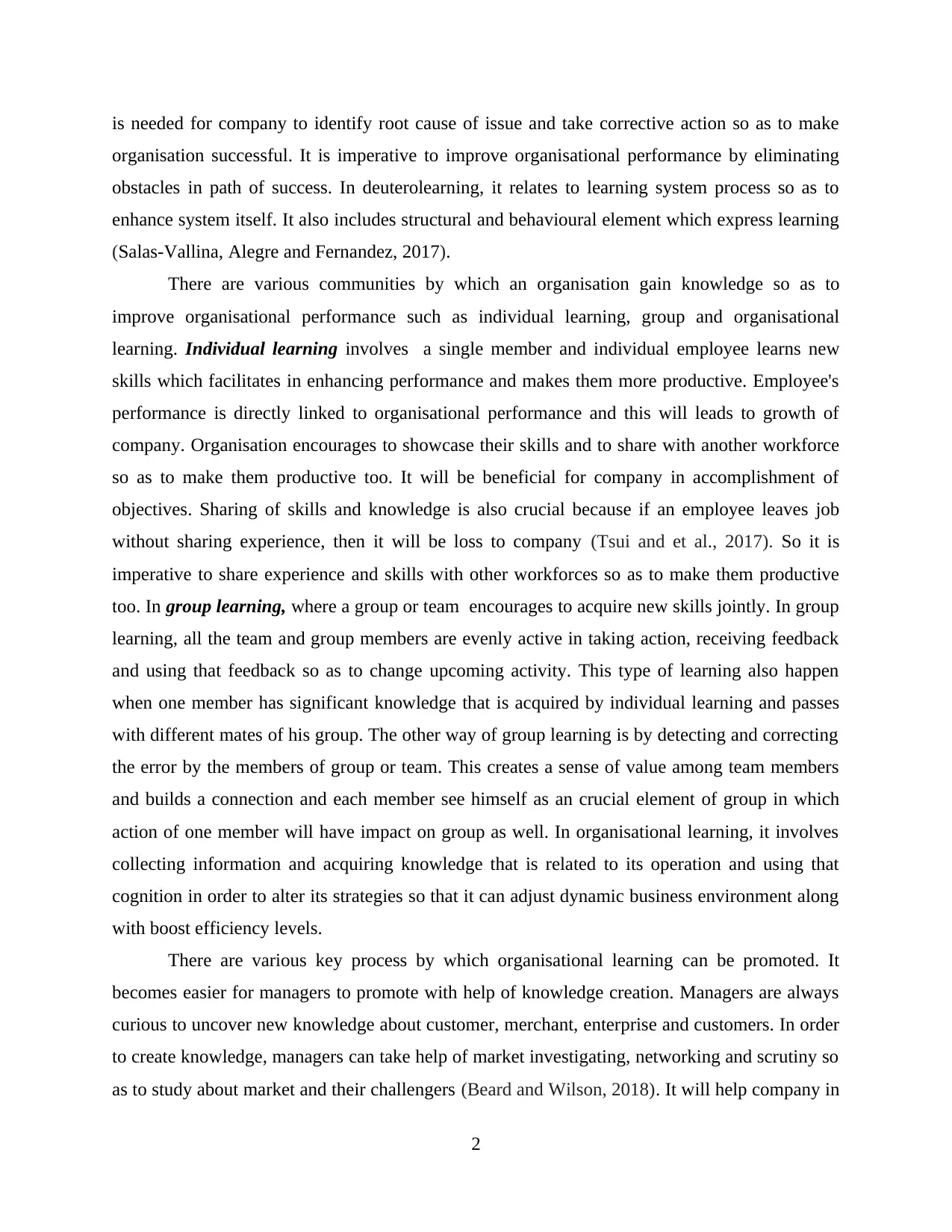
is needed for company to identify root cause of issue and take corrective action so as to make
organisation successful. It is imperative to improve organisational performance by eliminating
obstacles in path of success. In deuterolearning, it relates to learning system process so as to
enhance system itself. It also includes structural and behavioural element which express learning
(Salas-Vallina, Alegre and Fernandez, 2017).
There are various communities by which an organisation gain knowledge so as to
improve organisational performance such as individual learning, group and organisational
learning. Individual learning involves a single member and individual employee learns new
skills which facilitates in enhancing performance and makes them more productive. Employee's
performance is directly linked to organisational performance and this will leads to growth of
company. Organisation encourages to showcase their skills and to share with another workforce
so as to make them productive too. It will be beneficial for company in accomplishment of
objectives. Sharing of skills and knowledge is also crucial because if an employee leaves job
without sharing experience, then it will be loss to company (Tsui and et al., 2017). So it is
imperative to share experience and skills with other workforces so as to make them productive
too. In group learning, where a group or team encourages to acquire new skills jointly. In group
learning, all the team and group members are evenly active in taking action, receiving feedback
and using that feedback so as to change upcoming activity. This type of learning also happen
when one member has significant knowledge that is acquired by individual learning and passes
with different mates of his group. The other way of group learning is by detecting and correcting
the error by the members of group or team. This creates a sense of value among team members
and builds a connection and each member see himself as an crucial element of group in which
action of one member will have impact on group as well. In organisational learning, it involves
collecting information and acquiring knowledge that is related to its operation and using that
cognition in order to alter its strategies so that it can adjust dynamic business environment along
with boost efficiency levels.
There are various key process by which organisational learning can be promoted. It
becomes easier for managers to promote with help of knowledge creation. Managers are always
curious to uncover new knowledge about customer, merchant, enterprise and customers. In order
to create knowledge, managers can take help of market investigating, networking and scrutiny so
as to study about market and their challengers (Beard and Wilson, 2018). It will help company in
2
organisation successful. It is imperative to improve organisational performance by eliminating
obstacles in path of success. In deuterolearning, it relates to learning system process so as to
enhance system itself. It also includes structural and behavioural element which express learning
(Salas-Vallina, Alegre and Fernandez, 2017).
There are various communities by which an organisation gain knowledge so as to
improve organisational performance such as individual learning, group and organisational
learning. Individual learning involves a single member and individual employee learns new
skills which facilitates in enhancing performance and makes them more productive. Employee's
performance is directly linked to organisational performance and this will leads to growth of
company. Organisation encourages to showcase their skills and to share with another workforce
so as to make them productive too. It will be beneficial for company in accomplishment of
objectives. Sharing of skills and knowledge is also crucial because if an employee leaves job
without sharing experience, then it will be loss to company (Tsui and et al., 2017). So it is
imperative to share experience and skills with other workforces so as to make them productive
too. In group learning, where a group or team encourages to acquire new skills jointly. In group
learning, all the team and group members are evenly active in taking action, receiving feedback
and using that feedback so as to change upcoming activity. This type of learning also happen
when one member has significant knowledge that is acquired by individual learning and passes
with different mates of his group. The other way of group learning is by detecting and correcting
the error by the members of group or team. This creates a sense of value among team members
and builds a connection and each member see himself as an crucial element of group in which
action of one member will have impact on group as well. In organisational learning, it involves
collecting information and acquiring knowledge that is related to its operation and using that
cognition in order to alter its strategies so that it can adjust dynamic business environment along
with boost efficiency levels.
There are various key process by which organisational learning can be promoted. It
becomes easier for managers to promote with help of knowledge creation. Managers are always
curious to uncover new knowledge about customer, merchant, enterprise and customers. In order
to create knowledge, managers can take help of market investigating, networking and scrutiny so
as to study about market and their challengers (Beard and Wilson, 2018). It will help company in
2
Paraphrase This Document
Need a fresh take? Get an instant paraphrase of this document with our AI Paraphraser
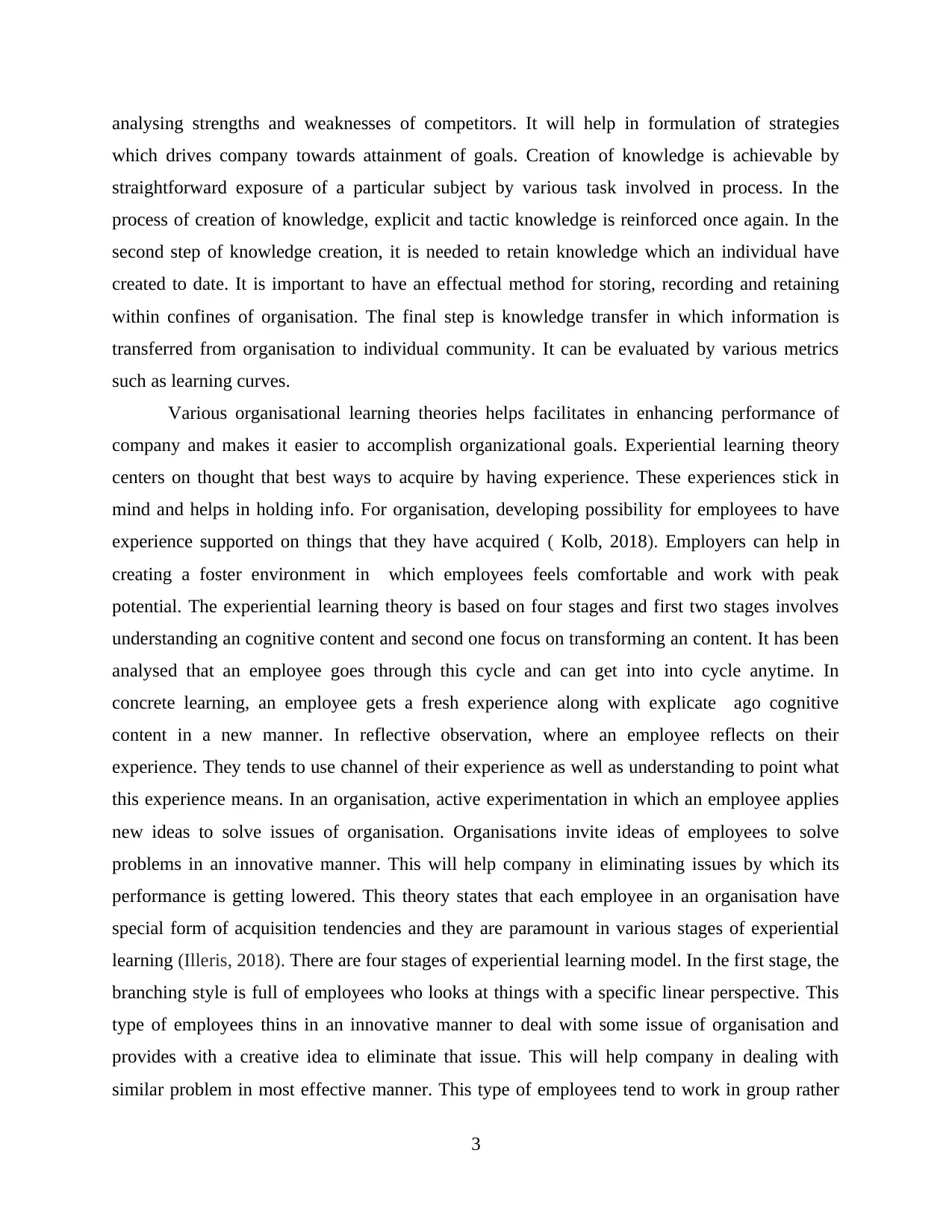
analysing strengths and weaknesses of competitors. It will help in formulation of strategies
which drives company towards attainment of goals. Creation of knowledge is achievable by
straightforward exposure of a particular subject by various task involved in process. In the
process of creation of knowledge, explicit and tactic knowledge is reinforced once again. In the
second step of knowledge creation, it is needed to retain knowledge which an individual have
created to date. It is important to have an effectual method for storing, recording and retaining
within confines of organisation. The final step is knowledge transfer in which information is
transferred from organisation to individual community. It can be evaluated by various metrics
such as learning curves.
Various organisational learning theories helps facilitates in enhancing performance of
company and makes it easier to accomplish organizational goals. Experiential learning theory
centers on thought that best ways to acquire by having experience. These experiences stick in
mind and helps in holding info. For organisation, developing possibility for employees to have
experience supported on things that they have acquired ( Kolb, 2018). Employers can help in
creating a foster environment in which employees feels comfortable and work with peak
potential. The experiential learning theory is based on four stages and first two stages involves
understanding an cognitive content and second one focus on transforming an content. It has been
analysed that an employee goes through this cycle and can get into into cycle anytime. In
concrete learning, an employee gets a fresh experience along with explicate ago cognitive
content in a new manner. In reflective observation, where an employee reflects on their
experience. They tends to use channel of their experience as well as understanding to point what
this experience means. In an organisation, active experimentation in which an employee applies
new ideas to solve issues of organisation. Organisations invite ideas of employees to solve
problems in an innovative manner. This will help company in eliminating issues by which its
performance is getting lowered. This theory states that each employee in an organisation have
special form of acquisition tendencies and they are paramount in various stages of experiential
learning (Illeris, 2018). There are four stages of experiential learning model. In the first stage, the
branching style is full of employees who looks at things with a specific linear perspective. This
type of employees thins in an innovative manner to deal with some issue of organisation and
provides with a creative idea to eliminate that issue. This will help company in dealing with
similar problem in most effective manner. This type of employees tend to work in group rather
3
which drives company towards attainment of goals. Creation of knowledge is achievable by
straightforward exposure of a particular subject by various task involved in process. In the
process of creation of knowledge, explicit and tactic knowledge is reinforced once again. In the
second step of knowledge creation, it is needed to retain knowledge which an individual have
created to date. It is important to have an effectual method for storing, recording and retaining
within confines of organisation. The final step is knowledge transfer in which information is
transferred from organisation to individual community. It can be evaluated by various metrics
such as learning curves.
Various organisational learning theories helps facilitates in enhancing performance of
company and makes it easier to accomplish organizational goals. Experiential learning theory
centers on thought that best ways to acquire by having experience. These experiences stick in
mind and helps in holding info. For organisation, developing possibility for employees to have
experience supported on things that they have acquired ( Kolb, 2018). Employers can help in
creating a foster environment in which employees feels comfortable and work with peak
potential. The experiential learning theory is based on four stages and first two stages involves
understanding an cognitive content and second one focus on transforming an content. It has been
analysed that an employee goes through this cycle and can get into into cycle anytime. In
concrete learning, an employee gets a fresh experience along with explicate ago cognitive
content in a new manner. In reflective observation, where an employee reflects on their
experience. They tends to use channel of their experience as well as understanding to point what
this experience means. In an organisation, active experimentation in which an employee applies
new ideas to solve issues of organisation. Organisations invite ideas of employees to solve
problems in an innovative manner. This will help company in eliminating issues by which its
performance is getting lowered. This theory states that each employee in an organisation have
special form of acquisition tendencies and they are paramount in various stages of experiential
learning (Illeris, 2018). There are four stages of experiential learning model. In the first stage, the
branching style is full of employees who looks at things with a specific linear perspective. This
type of employees thins in an innovative manner to deal with some issue of organisation and
provides with a creative idea to eliminate that issue. This will help company in dealing with
similar problem in most effective manner. This type of employees tend to work in group rather
3
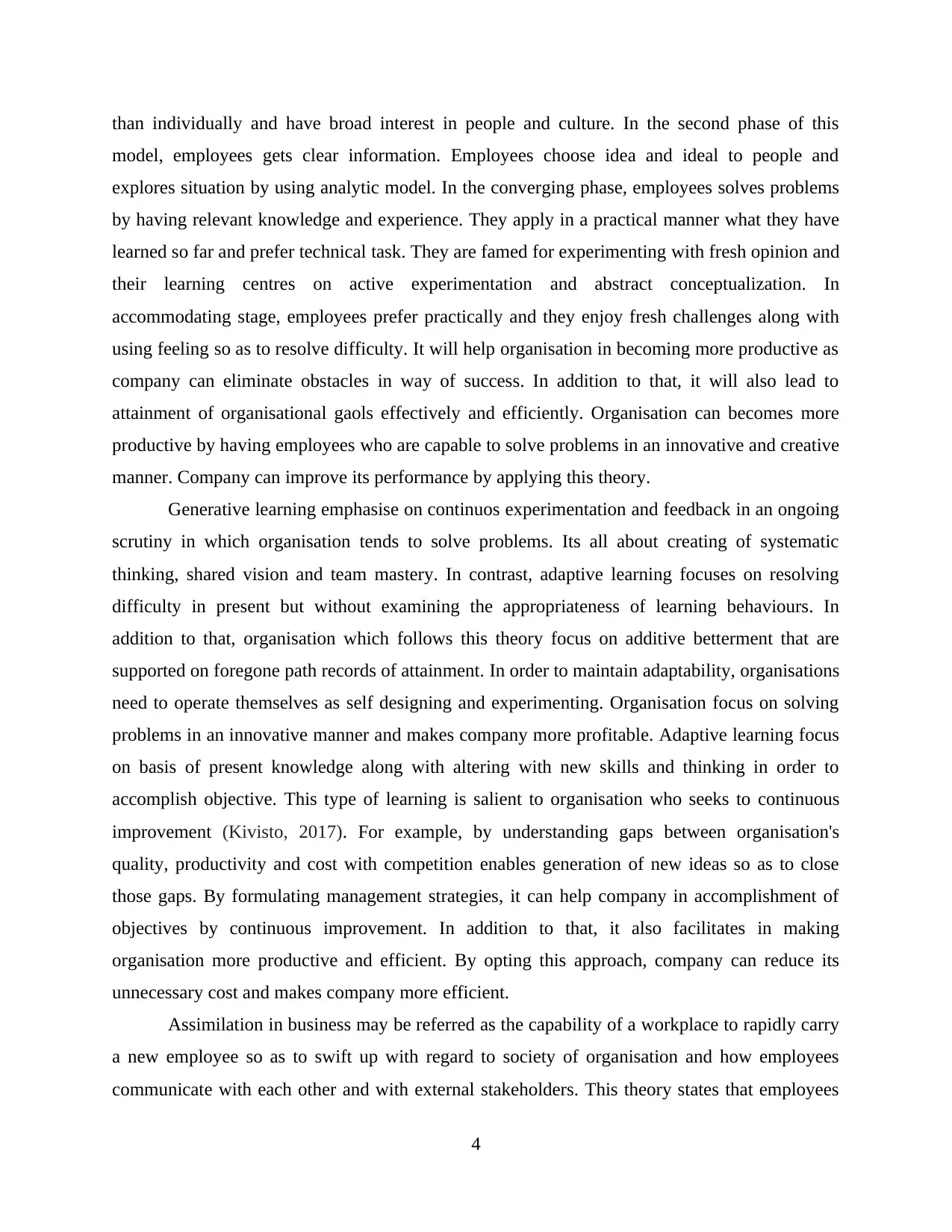
than individually and have broad interest in people and culture. In the second phase of this
model, employees gets clear information. Employees choose idea and ideal to people and
explores situation by using analytic model. In the converging phase, employees solves problems
by having relevant knowledge and experience. They apply in a practical manner what they have
learned so far and prefer technical task. They are famed for experimenting with fresh opinion and
their learning centres on active experimentation and abstract conceptualization. In
accommodating stage, employees prefer practically and they enjoy fresh challenges along with
using feeling so as to resolve difficulty. It will help organisation in becoming more productive as
company can eliminate obstacles in way of success. In addition to that, it will also lead to
attainment of organisational gaols effectively and efficiently. Organisation can becomes more
productive by having employees who are capable to solve problems in an innovative and creative
manner. Company can improve its performance by applying this theory.
Generative learning emphasise on continuos experimentation and feedback in an ongoing
scrutiny in which organisation tends to solve problems. Its all about creating of systematic
thinking, shared vision and team mastery. In contrast, adaptive learning focuses on resolving
difficulty in present but without examining the appropriateness of learning behaviours. In
addition to that, organisation which follows this theory focus on additive betterment that are
supported on foregone path records of attainment. In order to maintain adaptability, organisations
need to operate themselves as self designing and experimenting. Organisation focus on solving
problems in an innovative manner and makes company more profitable. Adaptive learning focus
on basis of present knowledge along with altering with new skills and thinking in order to
accomplish objective. This type of learning is salient to organisation who seeks to continuous
improvement (Kivisto, 2017). For example, by understanding gaps between organisation's
quality, productivity and cost with competition enables generation of new ideas so as to close
those gaps. By formulating management strategies, it can help company in accomplishment of
objectives by continuous improvement. In addition to that, it also facilitates in making
organisation more productive and efficient. By opting this approach, company can reduce its
unnecessary cost and makes company more efficient.
Assimilation in business may be referred as the capability of a workplace to rapidly carry
a new employee so as to swift up with regard to society of organisation and how employees
communicate with each other and with external stakeholders. This theory states that employees
4
model, employees gets clear information. Employees choose idea and ideal to people and
explores situation by using analytic model. In the converging phase, employees solves problems
by having relevant knowledge and experience. They apply in a practical manner what they have
learned so far and prefer technical task. They are famed for experimenting with fresh opinion and
their learning centres on active experimentation and abstract conceptualization. In
accommodating stage, employees prefer practically and they enjoy fresh challenges along with
using feeling so as to resolve difficulty. It will help organisation in becoming more productive as
company can eliminate obstacles in way of success. In addition to that, it will also lead to
attainment of organisational gaols effectively and efficiently. Organisation can becomes more
productive by having employees who are capable to solve problems in an innovative and creative
manner. Company can improve its performance by applying this theory.
Generative learning emphasise on continuos experimentation and feedback in an ongoing
scrutiny in which organisation tends to solve problems. Its all about creating of systematic
thinking, shared vision and team mastery. In contrast, adaptive learning focuses on resolving
difficulty in present but without examining the appropriateness of learning behaviours. In
addition to that, organisation which follows this theory focus on additive betterment that are
supported on foregone path records of attainment. In order to maintain adaptability, organisations
need to operate themselves as self designing and experimenting. Organisation focus on solving
problems in an innovative manner and makes company more profitable. Adaptive learning focus
on basis of present knowledge along with altering with new skills and thinking in order to
accomplish objective. This type of learning is salient to organisation who seeks to continuous
improvement (Kivisto, 2017). For example, by understanding gaps between organisation's
quality, productivity and cost with competition enables generation of new ideas so as to close
those gaps. By formulating management strategies, it can help company in accomplishment of
objectives by continuous improvement. In addition to that, it also facilitates in making
organisation more productive and efficient. By opting this approach, company can reduce its
unnecessary cost and makes company more efficient.
Assimilation in business may be referred as the capability of a workplace to rapidly carry
a new employee so as to swift up with regard to society of organisation and how employees
communicate with each other and with external stakeholders. This theory states that employees
4
⊘ This is a preview!⊘
Do you want full access?
Subscribe today to unlock all pages.

Trusted by 1+ million students worldwide
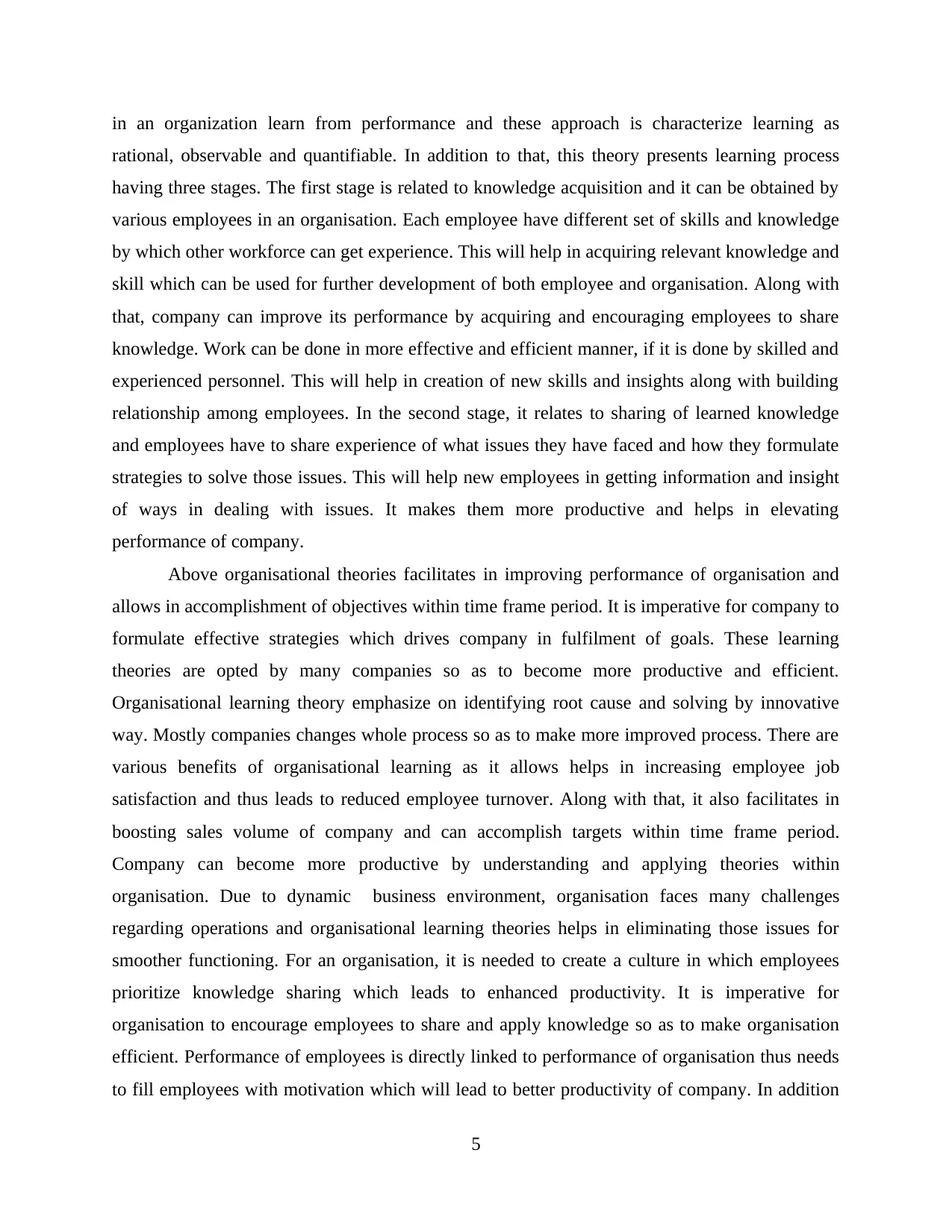
in an organization learn from performance and these approach is characterize learning as
rational, observable and quantifiable. In addition to that, this theory presents learning process
having three stages. The first stage is related to knowledge acquisition and it can be obtained by
various employees in an organisation. Each employee have different set of skills and knowledge
by which other workforce can get experience. This will help in acquiring relevant knowledge and
skill which can be used for further development of both employee and organisation. Along with
that, company can improve its performance by acquiring and encouraging employees to share
knowledge. Work can be done in more effective and efficient manner, if it is done by skilled and
experienced personnel. This will help in creation of new skills and insights along with building
relationship among employees. In the second stage, it relates to sharing of learned knowledge
and employees have to share experience of what issues they have faced and how they formulate
strategies to solve those issues. This will help new employees in getting information and insight
of ways in dealing with issues. It makes them more productive and helps in elevating
performance of company.
Above organisational theories facilitates in improving performance of organisation and
allows in accomplishment of objectives within time frame period. It is imperative for company to
formulate effective strategies which drives company in fulfilment of goals. These learning
theories are opted by many companies so as to become more productive and efficient.
Organisational learning theory emphasize on identifying root cause and solving by innovative
way. Mostly companies changes whole process so as to make more improved process. There are
various benefits of organisational learning as it allows helps in increasing employee job
satisfaction and thus leads to reduced employee turnover. Along with that, it also facilitates in
boosting sales volume of company and can accomplish targets within time frame period.
Company can become more productive by understanding and applying theories within
organisation. Due to dynamic business environment, organisation faces many challenges
regarding operations and organisational learning theories helps in eliminating those issues for
smoother functioning. For an organisation, it is needed to create a culture in which employees
prioritize knowledge sharing which leads to enhanced productivity. It is imperative for
organisation to encourage employees to share and apply knowledge so as to make organisation
efficient. Performance of employees is directly linked to performance of organisation thus needs
to fill employees with motivation which will lead to better productivity of company. In addition
5
rational, observable and quantifiable. In addition to that, this theory presents learning process
having three stages. The first stage is related to knowledge acquisition and it can be obtained by
various employees in an organisation. Each employee have different set of skills and knowledge
by which other workforce can get experience. This will help in acquiring relevant knowledge and
skill which can be used for further development of both employee and organisation. Along with
that, company can improve its performance by acquiring and encouraging employees to share
knowledge. Work can be done in more effective and efficient manner, if it is done by skilled and
experienced personnel. This will help in creation of new skills and insights along with building
relationship among employees. In the second stage, it relates to sharing of learned knowledge
and employees have to share experience of what issues they have faced and how they formulate
strategies to solve those issues. This will help new employees in getting information and insight
of ways in dealing with issues. It makes them more productive and helps in elevating
performance of company.
Above organisational theories facilitates in improving performance of organisation and
allows in accomplishment of objectives within time frame period. It is imperative for company to
formulate effective strategies which drives company in fulfilment of goals. These learning
theories are opted by many companies so as to become more productive and efficient.
Organisational learning theory emphasize on identifying root cause and solving by innovative
way. Mostly companies changes whole process so as to make more improved process. There are
various benefits of organisational learning as it allows helps in increasing employee job
satisfaction and thus leads to reduced employee turnover. Along with that, it also facilitates in
boosting sales volume of company and can accomplish targets within time frame period.
Company can become more productive by understanding and applying theories within
organisation. Due to dynamic business environment, organisation faces many challenges
regarding operations and organisational learning theories helps in eliminating those issues for
smoother functioning. For an organisation, it is needed to create a culture in which employees
prioritize knowledge sharing which leads to enhanced productivity. It is imperative for
organisation to encourage employees to share and apply knowledge so as to make organisation
efficient. Performance of employees is directly linked to performance of organisation thus needs
to fill employees with motivation which will lead to better productivity of company. In addition
5
Paraphrase This Document
Need a fresh take? Get an instant paraphrase of this document with our AI Paraphraser
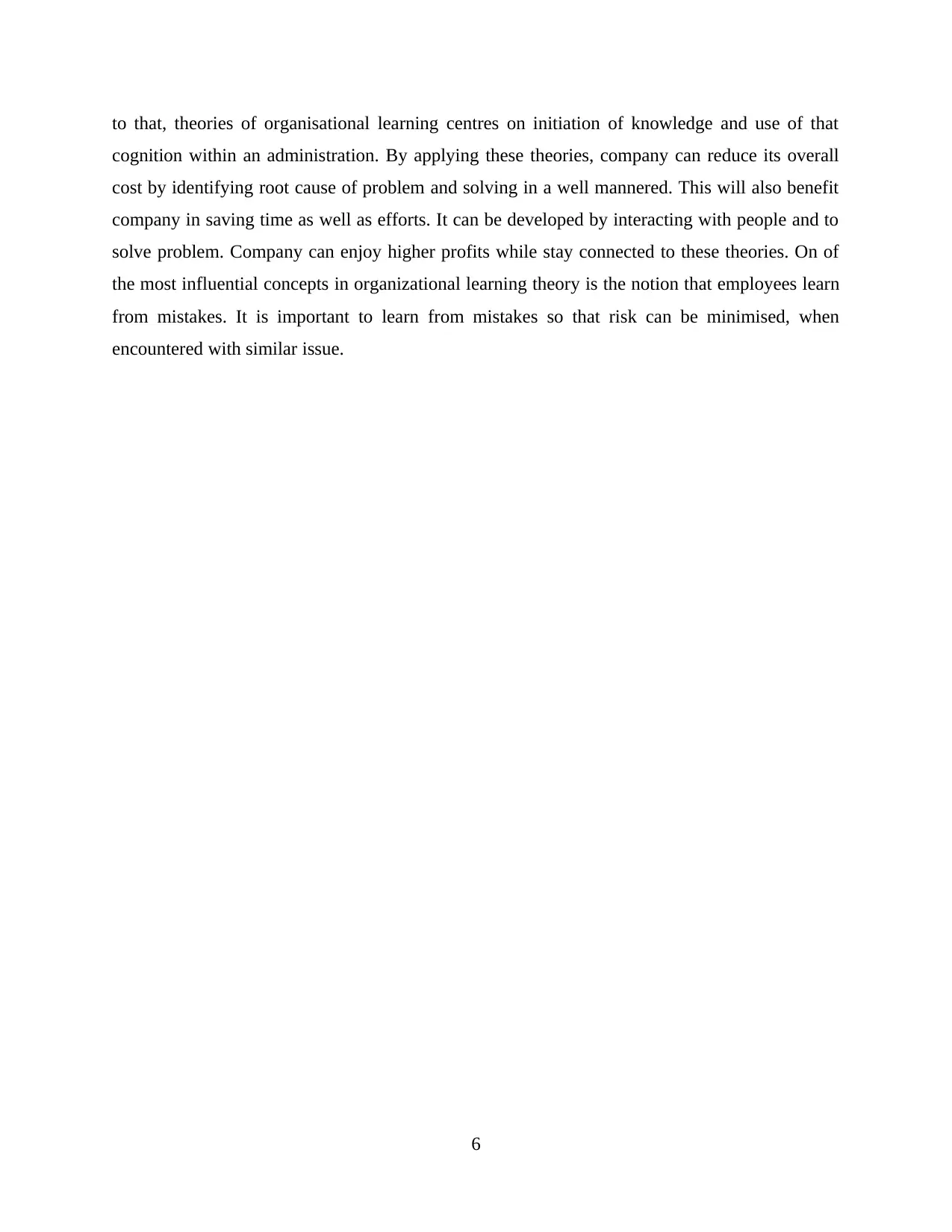
to that, theories of organisational learning centres on initiation of knowledge and use of that
cognition within an administration. By applying these theories, company can reduce its overall
cost by identifying root cause of problem and solving in a well mannered. This will also benefit
company in saving time as well as efforts. It can be developed by interacting with people and to
solve problem. Company can enjoy higher profits while stay connected to these theories. On of
the most influential concepts in organizational learning theory is the notion that employees learn
from mistakes. It is important to learn from mistakes so that risk can be minimised, when
encountered with similar issue.
6
cognition within an administration. By applying these theories, company can reduce its overall
cost by identifying root cause of problem and solving in a well mannered. This will also benefit
company in saving time as well as efforts. It can be developed by interacting with people and to
solve problem. Company can enjoy higher profits while stay connected to these theories. On of
the most influential concepts in organizational learning theory is the notion that employees learn
from mistakes. It is important to learn from mistakes so that risk can be minimised, when
encountered with similar issue.
6
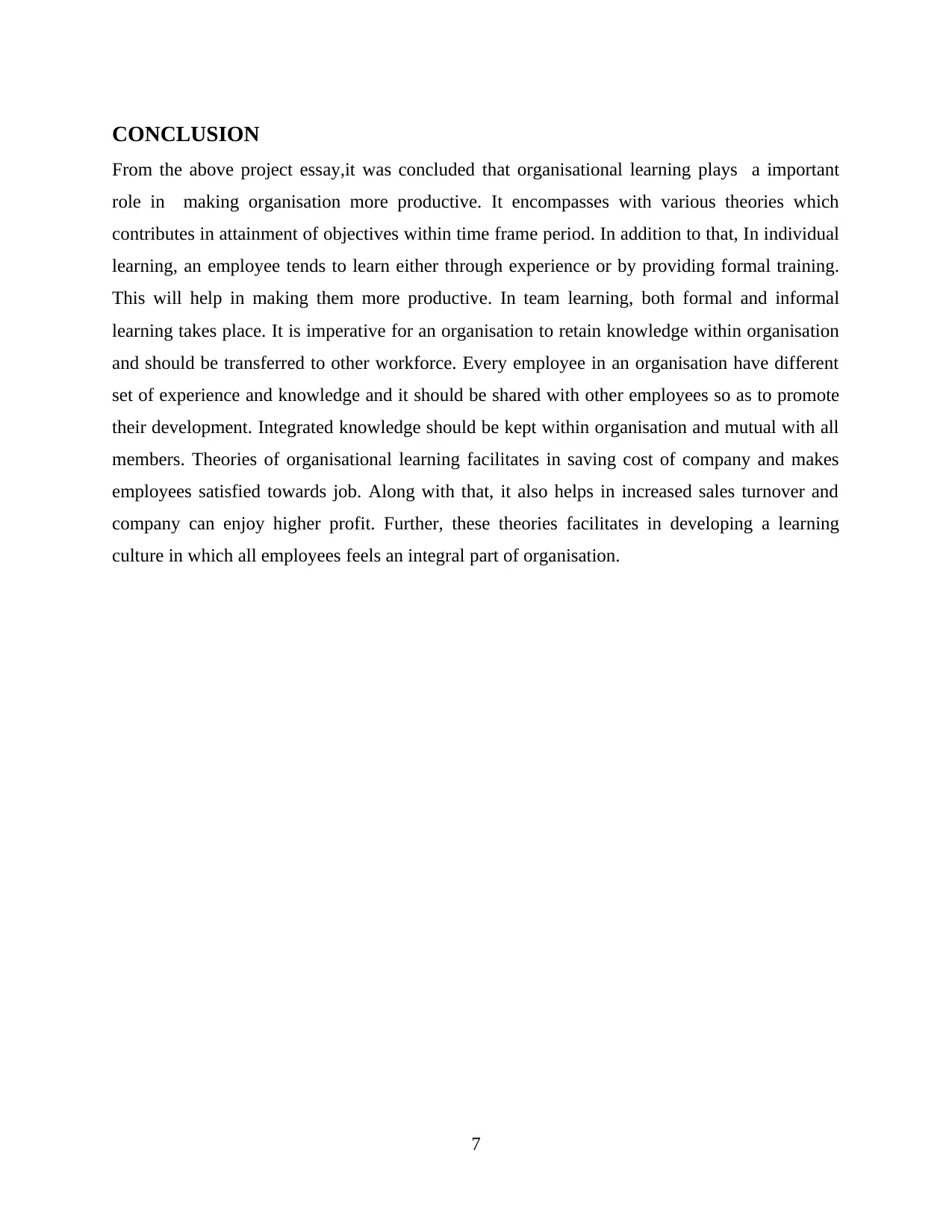
CONCLUSION
From the above project essay,it was concluded that organisational learning plays a important
role in making organisation more productive. It encompasses with various theories which
contributes in attainment of objectives within time frame period. In addition to that, In individual
learning, an employee tends to learn either through experience or by providing formal training.
This will help in making them more productive. In team learning, both formal and informal
learning takes place. It is imperative for an organisation to retain knowledge within organisation
and should be transferred to other workforce. Every employee in an organisation have different
set of experience and knowledge and it should be shared with other employees so as to promote
their development. Integrated knowledge should be kept within organisation and mutual with all
members. Theories of organisational learning facilitates in saving cost of company and makes
employees satisfied towards job. Along with that, it also helps in increased sales turnover and
company can enjoy higher profit. Further, these theories facilitates in developing a learning
culture in which all employees feels an integral part of organisation.
7
From the above project essay,it was concluded that organisational learning plays a important
role in making organisation more productive. It encompasses with various theories which
contributes in attainment of objectives within time frame period. In addition to that, In individual
learning, an employee tends to learn either through experience or by providing formal training.
This will help in making them more productive. In team learning, both formal and informal
learning takes place. It is imperative for an organisation to retain knowledge within organisation
and should be transferred to other workforce. Every employee in an organisation have different
set of experience and knowledge and it should be shared with other employees so as to promote
their development. Integrated knowledge should be kept within organisation and mutual with all
members. Theories of organisational learning facilitates in saving cost of company and makes
employees satisfied towards job. Along with that, it also helps in increased sales turnover and
company can enjoy higher profit. Further, these theories facilitates in developing a learning
culture in which all employees feels an integral part of organisation.
7
⊘ This is a preview!⊘
Do you want full access?
Subscribe today to unlock all pages.

Trusted by 1+ million students worldwide
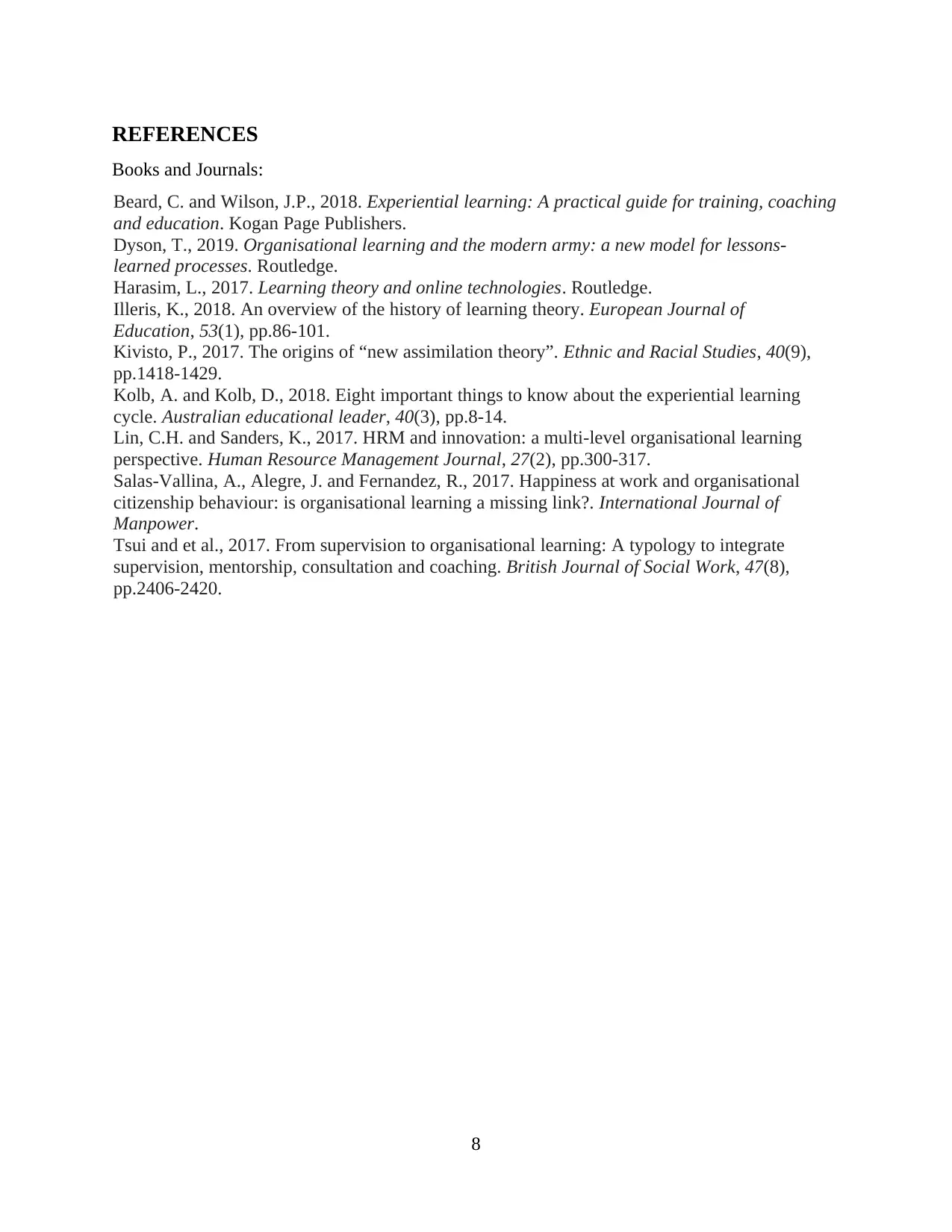
REFERENCES
Books and Journals:
Beard, C. and Wilson, J.P., 2018. Experiential learning: A practical guide for training, coaching
and education. Kogan Page Publishers.
Dyson, T., 2019. Organisational learning and the modern army: a new model for lessons-
learned processes. Routledge.
Harasim, L., 2017. Learning theory and online technologies. Routledge.
Illeris, K., 2018. An overview of the history of learning theory. European Journal of
Education, 53(1), pp.86-101.
Kivisto, P., 2017. The origins of “new assimilation theory”. Ethnic and Racial Studies, 40(9),
pp.1418-1429.
Kolb, A. and Kolb, D., 2018. Eight important things to know about the experiential learning
cycle. Australian educational leader, 40(3), pp.8-14.
Lin, C.H. and Sanders, K., 2017. HRM and innovation: a multi‐level organisational learning
perspective. Human Resource Management Journal, 27(2), pp.300-317.
Salas-Vallina, A., Alegre, J. and Fernandez, R., 2017. Happiness at work and organisational
citizenship behaviour: is organisational learning a missing link?. International Journal of
Manpower.
Tsui and et al., 2017. From supervision to organisational learning: A typology to integrate
supervision, mentorship, consultation and coaching. British Journal of Social Work, 47(8),
pp.2406-2420.
8
Books and Journals:
Beard, C. and Wilson, J.P., 2018. Experiential learning: A practical guide for training, coaching
and education. Kogan Page Publishers.
Dyson, T., 2019. Organisational learning and the modern army: a new model for lessons-
learned processes. Routledge.
Harasim, L., 2017. Learning theory and online technologies. Routledge.
Illeris, K., 2018. An overview of the history of learning theory. European Journal of
Education, 53(1), pp.86-101.
Kivisto, P., 2017. The origins of “new assimilation theory”. Ethnic and Racial Studies, 40(9),
pp.1418-1429.
Kolb, A. and Kolb, D., 2018. Eight important things to know about the experiential learning
cycle. Australian educational leader, 40(3), pp.8-14.
Lin, C.H. and Sanders, K., 2017. HRM and innovation: a multi‐level organisational learning
perspective. Human Resource Management Journal, 27(2), pp.300-317.
Salas-Vallina, A., Alegre, J. and Fernandez, R., 2017. Happiness at work and organisational
citizenship behaviour: is organisational learning a missing link?. International Journal of
Manpower.
Tsui and et al., 2017. From supervision to organisational learning: A typology to integrate
supervision, mentorship, consultation and coaching. British Journal of Social Work, 47(8),
pp.2406-2420.
8
1 out of 10
Related Documents
Your All-in-One AI-Powered Toolkit for Academic Success.
+13062052269
info@desklib.com
Available 24*7 on WhatsApp / Email
![[object Object]](/_next/static/media/star-bottom.7253800d.svg)
Unlock your academic potential
Copyright © 2020–2026 A2Z Services. All Rights Reserved. Developed and managed by ZUCOL.



